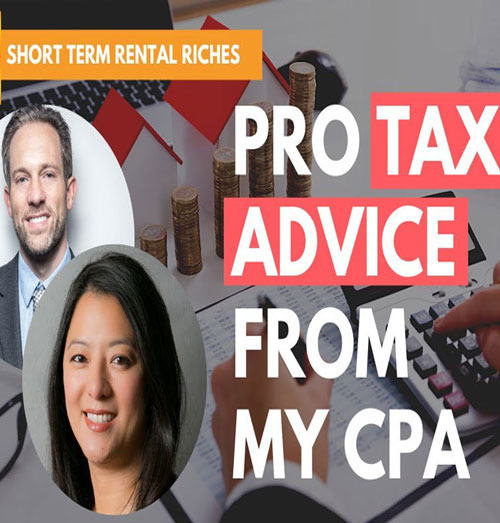How to build an Airbnb Business: Why we should “partner with the government” with special guest Tom Wheelwright Part 2
We have an extra special guest this week that you will not want to miss! He is one of the leading authorities on taxes in the nation when it comes to building your wealth tax free.
You may recognize the name, Tom Wheelwright, from his bestselling book Tax-Free Wealth: How to Build Massive Wealth By Permanently Reducing Your Taxes or because he is the CPA for Robert Kiyosaki! (author of Rich Dad Poor Dad).
Tom is an excellent teacher; his goal is to help people achieve their financial dreams faster by permanently and legally reducing their taxes. He has been a contributor to Entrepreneur magazine, and his work has been seen in Forbes, The Wall Street Journal, The Washington Post and on FOX, NPR, ABC News Radio and hundreds of other media outlets.
This week we will break down some insights from Tom’s latest book (I just had the pleasure of reading) The Win-Win Wealth Strategy: 7 Investments the Government Will Pay You to Make.
Don’t miss this extra special week as we discuss:
- Why short-term rentals can have excellent tax advantages
- The difference between active and passive income
- Material Participation vs. being a real estate professional
- Why the government will discount your investment activities (if you pick the right ones)
- Why the rich don’t pay taxes
If you want to hear more from Tom (make sure you listened to part one) but you can also find Tom at www.Wealthability.com or on one of his two popular podcasts: The WealthAbility® Show with Tom Wheelwright CPA and The WealthAbility® for CPAs Show.
Are you enjoying the podcast? Please subscribe, leave a rating and a review, and share it! This helps us reach others that may find the info helpful as well.
Get a copy of my 12 proven house rules to protect your property from almost every negative situation (highly recommended)
You can find all of our links here including our recommended resources, short-term rental playbook, Instagram, and more!
Click Here to view TranscriptTim: Alrighty, we’re back. And I’m excited to get back into part two with Tom wheelwright. So, if you missed last week’s episode, I highly encourage you to go back and check it out. Tom has a wealth of information in the area of accounting. He is Robert. Kiyosaki’s accountant has been for a long time and has some of the best-selling books on the subject. So, make sure you go back and check that out and you’ll discover why he thinks that we should be partnering with the government. So, without further do, I’m excited to jump back into the second part with wheelwright and to get into short-term rentals and what you need to know in regards to your taxes.
Welcome to short-term rental riches will discuss investing in real estate but with a specific focus on short-term rentals quick actionable items to acquire manage and scale your portfolio. I’m your host Tim Hubbard.
Airbnb, some of the recent stats they’ve had over a billion Jack ends, just Airbnb and on this show, we talk about short-term rentals not just on Airbnb but on home away and VRBO and direct bookings and all that and I love Airbnb’s it’s just one niche of real estate and there’s lots of different ways to do real estate but as you mentioned real estate can have a lot of good tax incentives because we’re incentivized by the government. So, wondering if you can give us just a brief difference between what a real estate professional is and why that might be difficult for a lot of people to qualify for if they have another full-time job and then material participation as relates to short-term rentals.
Tom: So, the big tax benefit for Real Estate this depreciation, right? You get to take a deduction for a portion of the property, whether it wears out or not. And depreciation on top of that, the bank they may put in 80% of the money but they don’t get any of the tax benefit. You get a hundred percent of the tax benefit, even though you may only put in twenty percent of the money, on top of that, if you do it right, you’ll end up putting in 10% of the money. The government will put in ten percent money, the bank will put an 80% of the money. See if you actually set this up right? You can end up only putting in 10% because the government put in the other 10% and that’s because of depreciation.
So, for Sample, If I had a hundred-thousand-dollar house property this year, my depreciation on, that could be as much as 25 to 30 thousand dollars even Oh, so let’s just run a couple of numbers here. Let’s say it’s 30,000 probably the highest it’s going to be and that’s the first-year depreciation. Okay, so let’s say I’m in a 33 percent tax bracket, okay? Because I can do this math, right? So, thirty thousand dollars so you put 20,000 ours down. Bang puts in eighty thousand dollars, right? You can do that all day long.
Now, you get a30,000-dollar deduction but you get your in a 33 percent tax bracket, which means that 30,000 are deduction is worth ten thousand dollars to you and you can get that ten thousand dollars today. You don’t have to wait until you file your tax return. You’re just not going to pay an estimated payments or with holding so you can get the money back immediately. So, the government puts in ten thousand dollars Bank puts an eighty thousand dollars and you put Ten thousand dollars on ten-thousand-dollar investment all of a sudden by the way, if you go from a twenty thousand dollars down to a ten thousand dollars down your return on investment, just doubled, right? Right. So, if you had a 20% return on investment, which is not that hard in short term, rental with a mortgage, right? You go in and you get, you have a twenty percent, all of a sudden now it’s 40 percent because the government put in half that money. So, the quickest way to increase your return is to follow the tax law and take the tax benefits of depreciation, particularly the Leverage Depreciation leverage me and the bank put in 80% of the money 70 to 80% of money.
All right, so we’ll start right there. That is the general rule. Now we have two specific rules. So, in tax law, you always start big and Broad and then you start narrowing it down. Okay, so what’s the next broadest role? Well, the next product rule is we need to be active in that bit. Active versus passive in order to get be a lot set, our other income with those depreciation losses. Now, there are some restrictions and I’ll get too. So don’t let me forget the business lost limitation rules. But generally speaking, you can offset any business income with any justice loss. That’s the general rule, as long as they’re both active or they’re both passive, okay? So, they either active losses can offset any kind of income passive losses come on the offset passive income.
Well, the first rule you have to meet is you have to be meeting this material participation. So, that means that you spend on General the general rule. Now, there are seven different rules. The general rule is you spend more than 500 hours a year in your business. Okay? Now, that business you can have multiple properties and that could be a single business, right? I mean, you could have Brinkley multiple businesses that feed into each other and they can be a single, they’re called an activity for tax purposes. So, you need those 500 hours.
If and then be combined, right? So that’s it can be combined as long as you treat it as it really is a single business. So, same owners, same management. Basically, it’s just a horizontally integrated business. Hey, could be a vertically, integrated. But in this case would be horizontally integrated. If you had like, ten, Airbnb or ten VRBO properties. If you’re a long-term rental, you have another test to meet and that test is, is that you have to spend more time in real estate than do all your other jobs combined and it has to be at least seven or 50 hours a year. Short-term rentals, do not have that requirement because short-term rentals are not considered rental real estate. They’re really more considered a service, they’re more like a hotel and so they’re treated like a hotel. So, they’re treated like a business regular business rather than being treated like real estate now, interestingly enough, there’s some interesting court cases on this Tim that I’m unaware of that. I think the courts actually did not address the proper issue. And the question is, if you do short-term rentals, and you also do long-term rentals, do the short-term rentals into those hours count towards your seminar 50 hours for your long-term rentals in the answer. I believe is without a question. Yes. Okay. And the reason is, is because it’s still real estate and may not be rental real estate, but it’s still real estate. And so, I do believe that it would still be in one of the seventh of categories of the code section 41697, the actually walks through, here’s what a real estate profession is well, certainly what you do on short-term, rentals fall into those categories.
All right, management, being the number one, right? You’re managing real estate want to be really clear. You cannot combine your short-term rentals with your long-term rentals for purposes of that 500 hour rule your short-term rentals, need their own 500 hours. Your long-term rentals need their own 500 hours, but you could have 500 hours in long-term, rentals, 500 hours in short-term rentals and qualify as a real estate professional if you don’t have another job because the combined number of hours is 1000, the remember the 11 other job, though. That’s a No-No job. If you have another job you got to work less than 1000 hours in, okay? Because you got to work more in your real estate needs of the other job. Yeah, I will tell you that the courts haven’t been really clear on this, but I think the courts never addressed this question and I don’t see how the court case I have in mind. I don’t think the attorney asked the right question again. It’s how good are your professionals but the general rule for short-term rentals is 500 hours.
Now you could actually do less than that and still qualify as long as you don’t have an employee who does more than that. So, if you do all the work and you don’t have anybody else, contractor employee, etc. housekeepers, it could be as little as a hundred hours, right? But that’s pretty hard. Because I mean you don’t want to be doing your own housekeeping. You know, I’ve been doing your own 12, you don’t want to be doing that stuff. So, I would kind of as a general rule, sit down with your CPA but I was General, I’d go with the 500 hours.
Tim: Now, could this work for someone? No Tom on the hundred our qualification. Let’s say someone bought a nice vacation rental right now, we’re in a couple months before the end of the year and they spent time designing it, they spend time Furnishing it. And it wasn’t quite operating yet and they exceeded that hundred hours and
Tom: They were doing all the work. Yeah, absolutely, they would qualify because in that first, when you’re first starting out, you probably are doing all the work. You’re going to hire contractors of course, to do some of it handyman, etc. But the chances are you’re going to do more work than any of them are going to do. You can’t have somebody else who does more work than you do, is kind of the general rule there. Yeah, I think that’s a good example Tim where some of these other rules might benefit you but then again, Then, like I said, that’s why you sit down with a good CPA who understands short-term rentals. I’ll tell you short term rentals is not something that very many people understand. Unfortunately, we’ve had you aren’t right in our Network discussions. We have been back and forth many times and I’ve had to walk them through the regulations to show them, here’s how this works. And we’ve walked through the court cases, here’s how this work because we do have a lot of clients who do short-term rentals.
I have a client, he’s got a big business themselves, this spouse does short-term rentals and she’s making it at it. She’s clearly very good at it. And they’re always rented out and they make money on it and she loves doing it. So, it’s interesting, we went from bed and breakfasts the VRBO, and now we have Airbnb. So, it’s an, it’s an interesting Dynamic. I do want to complain about something, though. Tim, I actually was looking at buying a house in Page, Arizona, and I lost because I can compete with a VRBO price. It’s an interesting dynamic in the real estate world. But it’s the value to a business owner is different than the value to a homeowner and it certainly changed the way homes are valued. It’s not really a complaint, I’m just teasing but yeah. Seriously the first question, the first question that the realtor asked me was, are you buying this for VRBO for yourself? And as soon as I said myself, they lost all interest.
Tim: Yeah, because people will pay more trying to chase those higher returns and that’s why Things we talked about on this channel to when we talk about short-term rentals. Well, a lot of people just use the word Airbnb to describe short-term rentals. But the reality is a short-term rental could be anything but from a tree house, to 20-bedroom mansion, overlooking the ocean. But when it comes to the IRS Tom, they have their own definition of what constitutes a short-term rental, right? It’s from what I understand seven days drying. So, could you tell us or help us? Explain that just a little bit more.
Tom: It’s not, it’s your average rental is seven days or less, that’s all it is. So, if you rented out five times during the year and your average rental and your total rental time was 35 days. Your short-term rental, okay? If it’s 36 days, you’re not a short-term rental. Yeah, because your average is more than seven days. But now, there are other rules that you have to consider. If you rent out, your personal residence in order to get the depreciation deductions and all the tax benefits, you can only use it 10 percent of the time, it’s rented.
So, if you went up for 300 days, you can only use it for 30 days, you have to use it for basically less than 30 days. If you use it for 32 days, then you can offset the income but you cannot create a loss. Okay, good. Now we have one other rule, which I’m sure you and your listeners. All familiar with which we fondly call the Augusta rule, which is basically the 14-day rental rule, which comes about from the Masters Tournament in Augusta Georgia, the golf tournament.
What? That Rule says, and it’s codified. So, it’s in the Internal Revenue code. If you rent your personal residence out for less than 15 days. So, it would be 14 days or less, then you don’t get any extra deductions, but you don’t pick up any income. So, if you run it for a thousand dollars a day, for 14 days, that’s fourteen thousand dollars of non-taxable income tax free income. That’s pretty sweet.
Tim: We covered a lot of topics on this podcast and a quick action will bite size format. So, you have the tools to acquire, improve your short-term rentals on your own. But if you want to go deeper, I’ve a special invite for you. Join us once a month that are rested, investor Clubhouse. For we go in-depth on an individual topic, everything from analyzing properties, improving operations and our bottom line, we cover it all at Club House members and myself are sharing best practices to earn the most Revenue with the least amount of headache and I would love to have you there as well. That’s REST methods.com forward slash Rich.
Our lives are shaped by Those we spend the most time with. So, if you want to take your STR to the next level, come join us. I hope to see you on the inside.
Tom: So, particularly like, I mean, for example, I building a property up in Park City Utah. Well Sundance, this is going to be up there so I could live in it for literally the whole year or more than 10% and then if I rent it out for less than 15 days now, that’s total. That’s cumulative, right? If I went out for less than 15 days, I don’t have to pay tax on any of that income. So that’s a pretty sweet rule especially if yeah, I mean I know people who Airbnb, they just go to a hotel locally because the Airbnb they can run from or you know there’s a heck of a vacation they don’t really go on vacation when they rent it out. You know people do all sorts of things. Just know that those are really the primary rules, the 14-day rule, the 10% rule, and then of course, the material participation law.
Tim: Well, it’s a really exciting space Tom. I want to be a, considering your time and know you are busy, man. I think it’s really exciting the opportunity we have with short-term rentals and it really can fit into so many Real Estate Investors portfolio in one way or another, whether it’s personal or they’re doing it to try to offset some income taxes. So really want to thank you for being on. How can people find you?
Tom: So best way is go to our website weldability.com, and I’m going to give you two options here. If you are concerned that your CPA is not up to quality standards, and you understand that your goal is to reduce your taxes. Then go to ultimately.com and click on the button that says schedule call. And we will match you up, not only with the right CPA, but a CPA that uses our system to reduce taxes. Our system is been very successful over the years and it’s consistent, it’s the same system everybody uses. We actually use software to make sure that it gets done properly. We have good quality control. So even though we have 60 different firms, they’re all following the same system which is very, very important.
If you have a CPA that you go, I like my CPA. I think they would learn the stuff but they just don’t know it. Send your CPA. Have your CPA go to Wells? Millie.com have them click on schedule call, and get them into our Network. We are building this network. We have people coming in, literally every week CPA firms are long-term goal is 10,000 CPA firms around the world. So, this is not a small Endeavor where out to completely revolutionize a profession. So, I love my profession. I just think About 30 years behind the times.
Tim: Mmm, well, thanks so much Tom. I mean, I feel like we could talk for hours because there’s so much so I hope we get a chance to have you back on some time in the future. And also knowing that the rules are always changing to. So, it’s something we got to stay on top of want to thank you again so much for being on and we hope to talk with you again soon.
Tom: Absolutely. Thanks Tim
Tim: Want to get on the fast track to Financial Freedom through short-term rentals what all starts with the properties you acquire but you want to make sure, that you acquired the right properties, I want to give you my e-book that will show you how to do just that. There is no charge. It’s my gift to you for being one of our subscribers. Just go to restmethods.com. That’s REST methods.com
RELATED PODCAST EPISODES















